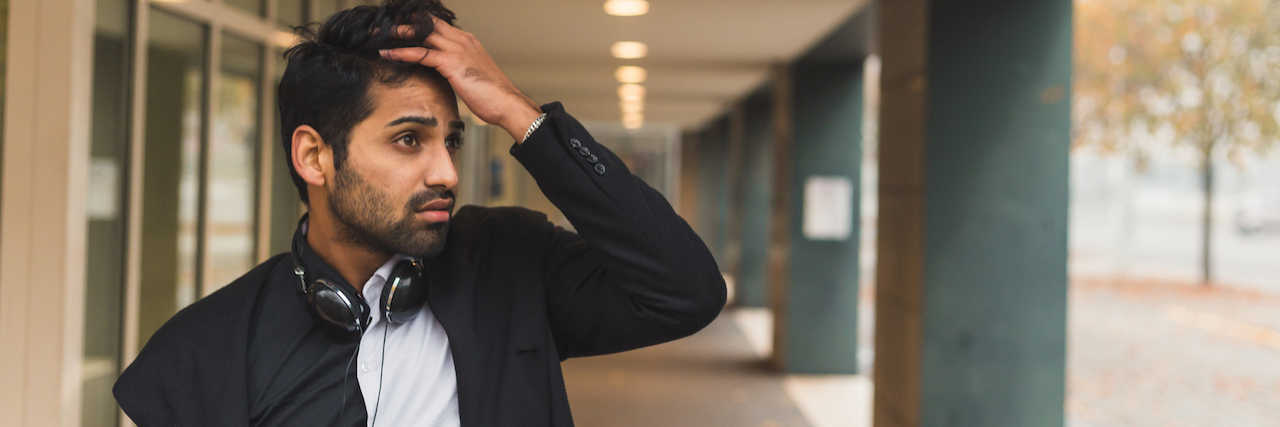As I sat in a tattoo parlor in India’s financial capital, Mumbai, staring at the sharp needle piercing through my skin creating a semicolon, I winced in pain as myriad thoughts plundered my mind. As the needle created an outline and blood oozed out in equal measure, I was awe-struck at all the internalized lessons my depression and anxiety had taught me and how this tattoo had become a symbol of my struggles for the world to witness.
Maybe a conversation starter to speak about how common depression and mental illness are? Probably.
A conversation that could give someone hope? Hopefully.
My struggle with extreme bouts of anxiety and depression were really difficult and fraught with panic attacks, isolation and extreme self-esteem issues during teenage years with no guidance whatsoever. Hence, this tattoo and the underlying meaning has signified resilient strength to me.
Within days of the tattoo healing, many friends and strangers wondered why would anyone get a semicolon tattooed on their arms instead of something more prominent. Conversations followed and the significance of the tattoo was explained. Some furrowed their brows while others were forthcoming with genuine surprise and shared their own tales of battling similar issues.
Some just laughed it off, asking me to get a question mark instead. All puns intended.
I’ve dealt with clinical depression since childhood and situations turned terse and extremely dangerous when at the cusp of turning 21, I spiraled downwards, unable to handle emotional turmoil and a feeling of helplessness, anger and dejection took over.
I would stay put in my room, staring at the wall and never leave the house for days altogether. Even my love for books subsided as darker thoughts took credence and a deep sinking feeling pushed me down. I shut myself down into my own pit of loathing and self-hatred. All contact with the outside world was hackneyed, jobs were quit and academic pursuits halted in a self-destructive sadness coupled with a feeling of helplessness.
While friends and family tried reaching out to help, I lacked the courage to open up and stigma attached to mental illnesses prevented them from acknowledging the reality of the issues. One day, I just wanted to take one step to normalcy and went to a psychiatrist to seek help and counseling.
When I decided to speak openly about my issues, things turned polarizing. While friends put their stock and tried supporting me in what ever manner they could, my former organization asked me to exit in a “very considerate manner.”
The medicines and their self-flagellating, sleep boosting cortisol production in my brain did elevate my spirits. But the very act of putting together building blocks of my crumbling life made me think more about my choices. I wish I had realized sooner about building a network of supportive friends. I wish I had initiated the conversations about depression and mental illness sooner, rather than veering away from the subject. I wish I could have made better choices.
And then I tried. It is years of hard work and even today, I slip back into depression, but just the act of speaking up helps.
In South Asia, mental illness is viewed through the lens of stigma and spoken about in hushed tones. Many celebrated artists in India have spoken about their struggles to create conversations about the severity with which the issues need to be spoken of, some succeeding to a greater extent while others becoming the fodder of discussions for a day or two.
Nearly 10 percent of Indians struggle with depression and the numbers are alarmingly set to increase in the coming years. Yet, the stigma around mental illnesses in the country paints a dangerous picture.
Also sample these facts: As per World Health Organization estimates, 36 percent of Indians are likely to struggle with a major depressive episode at some point in their lives.
Yet as a society, the conversations haven’t been going anywhere substantial and there has been no real constructive change at the grassroots for decades while thousands of Indians live on the margins with no medical assistance.
Today, my parents know my own struggles with depression and acknowledge its implications, a fact they weren’t aware when I had refused to speak out. My tattoo is a reminder for them of the issues they may deal with and the help they must seek when in dire need.
When I tried explaining them my situation, I used a basic analogy which worked in simplifying the issues, though I believe they are anything but complicated in the longer run.
I sat down with my mother and explained: You have a fever, you visit a doctor. You have extreme feelings of helplessness and conflicting emotions, you again visit a doctor. There is no stigma whatsoever with mental illness. She smiled and a lot of things changed that day onwards — internally as well as externally.
All of us need a little bit of sunshine at the end of a long dark tunnel. And for a long period of time, depression did define my existence and choices. Hopefully, never any more.
Through difficult days, you learn some life lessons. Here’s what I offer to friends or anyone dealing with depression.
1. Do not self-diagnose yourself. Seek help. It will make all the difference.
2. Speak up. To anyone. There are tonnes of helpline numbers available. Or just parents, friends or anyone you are comfortable with.
3. Heartbreaks happen. Failures happen. Life goes on. Have faith.
4. Don’t internalize your issues. You don’t have to do this alone. Like, really.
If you or someone you know needs help, visit our suicide prevention resources page.
If you need support right now, call the National Suicide Prevention Lifeline at 1-800-273-8255, the Trevor Project at 1-866-488-7386 or text “HOME” to 741-741. Head here for a list of crisis centers around the world.
We want to hear your story. Become a Mighty contributor here.
Thinkstock photo via tixti

